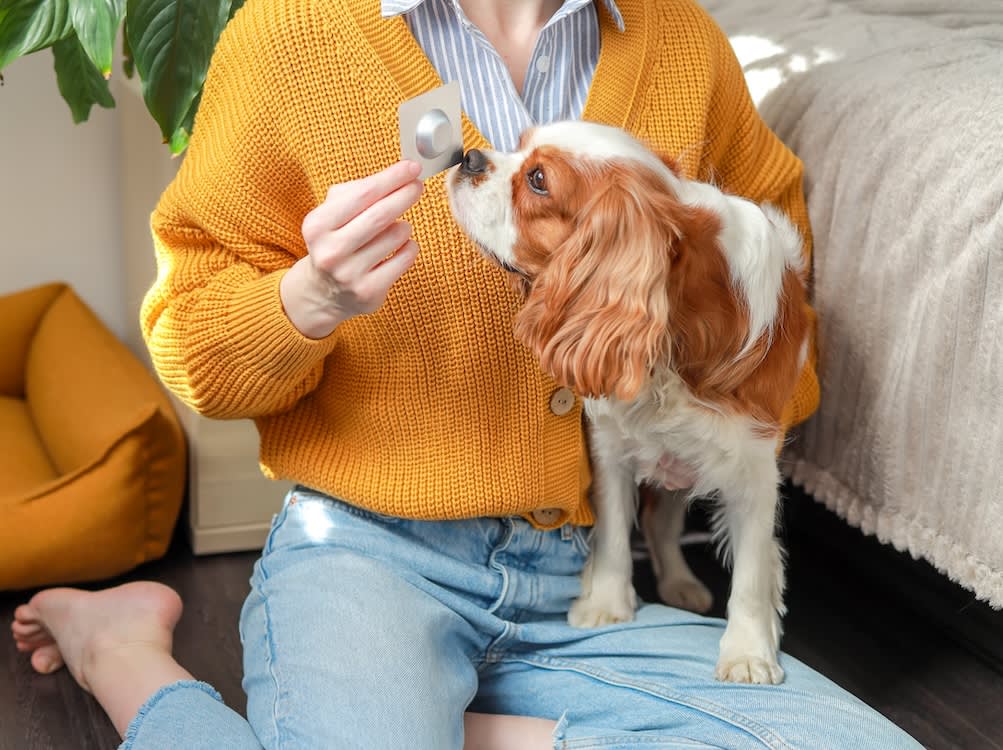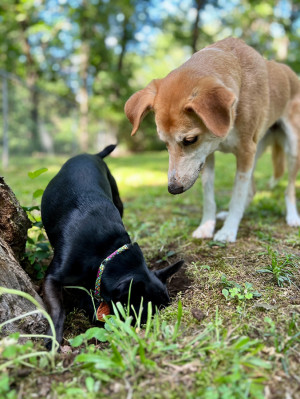Here’s How Often to Worm Dogs
The experts answer all your questions

Share Article
In this article:
What is worming? Worm symptoms in dogs Worming schedule Types of worms Worming treatments Choosing the right treatment Worming treatment side effects Preventing worm infestations When to see a vet FAQs
As pet parents we have a long list of healthcare priorities for our dogs; vaccinations, training, flea medication and now worming treatment? The list can get confusing, so let’s take a look into what we need to do to protect our pooches from worms and when to treat them to clear up some of the confusion.
What is worming, and why is it important?
In this article we talk about “worming” our dogs as this is generally how it is termed. This means a treatment using a “dewormer” medication called anthelmintics to treat for worms, also known as helminths. Dogs, cats and even us humans can get worms. They come in a range of species and reside in different locations within your pet once infected. They can cause an issue through sheer numbers and also injury to the body in particular in the young or vulnerable dogs. Anti-parasitic treatment is used in the UK prophylactically (preventative) as well as a treatment to limit the harm these critters can do.
Signs your dog has worms
Some signs that your puppy or pet has worms can vary from mild to severe. Lethargy, weight loss, vomiting and diarrhoea can occur, as well as having a pot-bellied appearance. Sometimes you can see the worms in your dog’s vomit or faeces.
Recommended worming schedule for dogs
The recommended worming schedule for dogs depends on a number of factors such as age or underlying conditions, so use the following as a guide but always talk to your vet as they will be able to advise on any local risks and individual specifications. The European Scientific Counsel on Companion Animal Parasites (ESCCAPopens in new tab) have developed some guidelines:
Puppies
Puppies should be wormed from 2–3 weeks of age (weight depending) and then every two weeks until 12 weeks old then monthly until six months old.
Adult dogs
Treat every 1–3 months dependent on risk analysis – for example, if spotted eating slugs/snails, are on a raw meat diet or live in an endemic area – then worm monthly.
Pregnant or nursing dogs
Pregnant dogs should be wormed from 40 days after mating until two days postpartum, then again alongside the puppies when they get wormed at two weeks old and onwards.
Senior dogs
Treat for worms as other adult dogs unless contraindicated with underlying conditions.
Common types of worms dogs get
The types of worms dogs can get can be grouped into intestinal and non-intestinal worms. The intestinal worms include roundworms – the typical stringy worms people think of when talking about worms found in dogs. Puppies are typically born with these worms, and they can also be passed through their mothers milk, and older dogs pick them up by ingesting eggs from the environment or undercooked meat. They can cause blockages with a heavy burden so it is important to stick to a worming schedule throughout your dog’s life.
Another sort of intestinal worm are tapewormsopens in new tab, dogs can ingest tapeworms from the environment if they have access to carcasses or raw offal. A type of tapeworm can also be passed on by fleas, so make sure to treat for tapeworm if you notice any fleas. Tapeworms can cause issues in other tissues of the body not just the intestines, so it is important to protect your pup from them.
Non-intestinal worms include lungwormsopens in new tab, hookworms and whipworms causing issues such as lung damage and coughing, weight loss, bloody diarrhoea and anaemia. The main transmission route of lungworm is through the ingestion of slugs and snails, so if you spot your dog eating grass or eating slugs or snails always make sure they are covered for lungworm.
Types of worming treatments for dogs
Worming treatments for dogs come in tablet, chewable treat forms or as a topical spot on. The most reliable and effective medication is prescription-only from your vets after a physical examination as per RCVSopens in new tab regulations, to make sure your pup is healthy for the medication, and the correct type and dose is used. There are some treatments available over the counter but only buy from reputable brands and be aware they may not be as effective. Please note there is no over-the-counter medication for treating or preventing lungworm, this medication is only currently available with a prescription from your vets.
There are advertised “natural worming” options available on the market such as giving rabbit ears to dogs as a dewormer. While they may scrape the odd worm off the lining of the gut mechanically, they do not kill any worms or protect any of the other organs affected by internal parasites where they actually reside and mature.
How to choose the right worming treatment for dogs
Each worming medication will only treat certain types of worms, there are some that can cover a combination. So check the information on the pack or ask your vet what the wormer prescribed treats to make sure your pup is fully covered.
Potential side effects of worming medications
Worming treatment as with all medications has a risk of side effects. These are usually mild clinical signs such as vomiting or diarrhoea, in rare cases there may be allergic reactions or neurological symptoms such as incoordination. If any side effects are seen, notify your vet for advice on treatment.
One effect of wormers which can be a bit of a surprise is seeing the worms (sometimes in large quantities) in your dogs faeces or vomit after treatment. But don’t panic! This is the wormer doing its job, they just need to come out one way or another. If this happens, look out for any signs of discomfort in passing the worms to make sure your pup doesn’t need any additional treatment to help them pass.
How to prevent worm infestations in dogs
Treating every 1–3 months is the best way to prevent a heavy worm burden building up in your pooch. But other ways to protect your pet is to not allow them to scavenge carcasses, eat rodents, or slug and snails. Pet parents who feed their dogs a raw diet should be wary of contamination and to make sure the food is stored correctly and frozen for at least a week between -17 and -20C.
When to seek a vet for worms
When you first get your pup or at your next vet visit talk to your vet about anti-parasitic treatment and the best routine for your pup. If you notice any symptoms such as seeing worms in their faeces or vomit, or spot a pot-bellied appearance, make an appointment to get them checked over and to look into the possibility of worms.
Bottom line: how often should you worm your dog?
Puppies should be wormed from 2–3 weeks of age every two weeks until 12 weeks old and then monthly until six months old. Adult dogs should be treated for worms every 1–3 months. If travelling abroad check to make sure your pup is covered for additional parasites found outside the UK, such as heartworm.
Frequently asked questions: how often to worm dogs
Can over-worming harm my dog?
Yes, over-worming your dog can cause issues such as potential adverse effects if overdosed, along with gastrointestinal issues. Or if they’re treated too frequently there is a possibility of the worms becoming resistant to the medication.
What happens if I miss a worming dose?
If you miss a worming dose give it as soon as you're able, and adjust the timing of the subsequent doses to be correct from when you gave the medication last in order to space them out appropriately.
Is worming necessary for indoor dogs?
Yes, indoor dogs are still taken for walks and go outside where they have the opportunity to pick up worms from the environment. Along with other transmission routes such as from fleas, undercooked meats and from puppyhood from their mother’s milk.
Is worming my dog expensive?
There are a variety of different worming treatments available in different price ranges, costs of having a dog are not by any means small, but there are many options to suit you and your dog’s individual needs. Talk to your vet about any healthcare plans they have available, as this can spread the cost of preventative healthcare.
How fast does a worm treatment for dogs work?
The worming treatment can start to work within a few hours of being administered. You may notice dead worms in their faeces or vomit for up to a week after as they’re excreted.
Resources
Helm, Jenny, and Eric Morgan. “Canine and Feline Lungworm Infections in the UK.opens in new tab” In Practice, vol. 39, no. 7, July 2017, pp. 298–315.
RCVS. “‘Under Care’ - New Guidance.opens in new tab” Royal College of Veterinary Surgeons, 2023.
“Worm Control in Dogs and Cats.opens in new tab” European Scientific Counsel Companion Animal Parasites,.
Wright, Ian. “Tapeworms of UK Cats and Dogs: An Update.opens in new tab” The Veterinary Nurse, vol. 4, no. 9, Nov. 2013, pp. 550–55.

Dr Josephine Corrick, BVMSci, BSc, MRCVS
Dr Josephine Corrick, BVMSci, BSc, MRCVS is a veterinary surgeon based in the south of Scotland where she has been since graduating from the University of Surrey. She enjoys working in general practice treating small animals. Her particular interests include diagnostic imaging and the treatment of wildlife.
Having found a passion for veterinary medicine after doing a degree in Equine Sports Science she still enjoys including horses in her life by spending time with her highland ponies. Alongside her clinical work, she helps run a smallholding caring for rare breed sheep and exploring the Scottish countryside with her young Cocker Spaniel.
Related articles
![Two dogs digging outside in the dirt.]()
Types of Worms In Dogs: How to Detect and Treat Worms In Dogs
Here are the types of worms your pup could get, how you know they have them in the first place and how to get rid of them for good
![One month old brown brindle Jack Russell puppy lies on a woman's lap. She strokes the dog's soft tummy. Mother dog is watching nearby.]()
Puppy Parasites 101: What You Need to Know to Keep Your Pup Safe
Does your pup have a pot belly? Have you noticed something moving in their poo? Yes, it’s time to talk about puppy parasites
![Dog looks up at owner on a walk through the city]()
7 Ways to Stop Your Dog From Scavenging On Walks
If your dog tries to wolf down literally everything in sight, you need this advice



